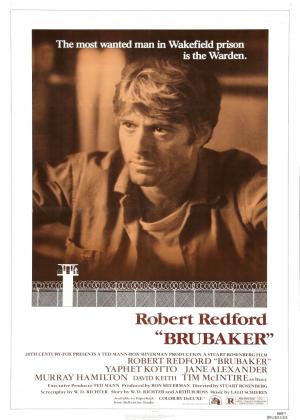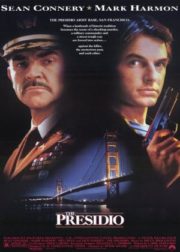
“Brubaker” is a 1980 American prison drama film directed by Stuart Rosenberg. The film is based on the real-life experiences of Thomas Murton, a prison reform advocate, and stars Robert Redford in the title role. “Brubaker” delves into the corrupt and brutal conditions within a Southern prison system and explores one man’s quest for justice and reform.
Plot Summary:
The film follows the story of Henry Brubaker (Robert Redford), who arrives at Wakefield State Prison under the guise of a new inmate. In reality, Brubaker is the new warden, determined to uncover and expose the rampant corruption and human rights abuses that have plagued the prison for years.
Brubaker discovers a system plagued by graft, brutality, and a disregard for human dignity. He witnesses the inhumane treatment of prisoners, including overcrowding, violence, and even murder. Determined to bring about change, Brubaker employs an undercover approach, gaining the trust of inmates while secretly gathering evidence against the corrupt staff.
As Brubaker’s investigations continue, he faces opposition from both the prisoners and the prison administration. He forms alliances with sympathetic staff members and prisoners who share his vision for reform. Together, they expose the abuses and attempt to bring justice to the inmates while battling a system resistant to change.
Themes and Impact:
“Brubaker” delves into themes of institutional corruption, social justice, and the struggle for reform. The film sheds light on the deplorable conditions within the prison system and raises important questions about the treatment of prisoners and the responsibility of those in positions of power.
The impact of “Brubaker” lies in its powerful portrayal of a flawed system and the determination of one individual to effect change. The film serves as a critique of the prison industrial complex and sheds light on the need for prison reform and the protection of human rights. It highlights the importance of transparency, accountability, and the pursuit of justice within the criminal justice system.
Robert Redford’s performance as Brubaker brings depth and conviction to the character, portraying his tenacity, empathy, and dedication to the cause. The film’s realistic depiction of the harsh realities of prison life and the moral dilemmas faced by those seeking change resonated with audiences and critics alike.
Conclusion:
“Brubaker” is a compelling prison drama that shines a light on the corrupt and brutal conditions within the prison system. Robert Redford’s powerful performance anchors the film, bringing to life the character of Brubaker and his quest for justice and reform. The film’s exploration of institutional corruption, social justice, and the struggle for change resonated with audiences, highlighting the need for prison reform and the protection of human rights. “Brubaker” remains a relevant and impactful film that raises important questions about the criminal justice system and the power of individuals to effect positive change.
Submit your review | |
Brubaker, released in 1980 and directed by Stuart Rosenberg, is a powerful and thought-provoking drama that delves into the depths of corruption, injustice, and the fight for reform within the prison system. Anchored by a remarkable performance by Robert Redford in the titular role, the film sheds light on the harsh realities of the penal system and the resilience of the human spirit.
Based on a true story, Brubaker follows the journey of Henry Brubaker, a new warden who goes undercover as an inmate to expose the rampant corruption and abuse within the Wakefield State Penitentiary. Brubaker witnesses firsthand the deplorable conditions, violence, and systemic mistreatment faced by the prisoners, and he becomes determined to bring about change and restore justice.
Robert Redford delivers a commanding performance as Henry Brubaker, capturing the character's unwavering determination, moral compass, and quiet intensity. His portrayal humanizes Brubaker, showcasing the internal struggles he faces as he navigates the treacherous world of the prison and fights against the ingrained corruption. The supporting cast, including Yaphet Kotto, Jane Alexander, and Morgan Freeman, deliver compelling performances, adding depth and authenticity to the narrative.
The film's gritty and realistic portrayal of prison life is both haunting and eye-opening. The stark cinematography and production design create an atmosphere that immerses the audience in the harsh realities faced by the inmates. The script explores the complex dynamics among the prisoners, the corrupt officials, and the few individuals who genuinely seek reform, offering a nuanced examination of power, corruption, and the quest for justice.
At its core, Brubaker is a story of redemption and the resilience of the human spirit. It highlights the importance of challenging the status quo and fighting for what is right, even in the face of overwhelming odds. The film tackles themes of social justice, institutional reform, and the ethical responsibility of those in positions of power.
While Brubaker can be bleak and unflinching in its portrayal of the harsh realities of prison life, it also offers glimmers of hope and moments of humanity. It raises important questions about the criminal justice system and the treatment of prisoners, provoking reflection and discussion long after the credits roll.
Overall, Brubaker is a gripping and thought-provoking drama that sheds light on the dark underbelly of the prison system and the indomitable spirit of those who dare to challenge it. With its powerful performances, compelling storytelling, and social relevance, the film serves as a reminder of the need for compassion, reform, and the pursuit of justice. Whether you're interested in true stories, social issues, or simply engrossing character-driven narratives, Brubaker is a film that will leave a lasting impact.
























